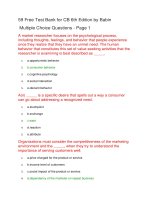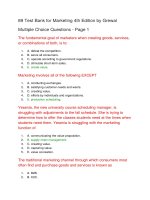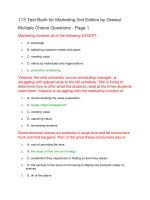Test bank for psychology 6th edition by hockenbury
Bạn đang xem bản rút gọn của tài liệu. Xem và tải ngay bản đầy đủ của tài liệu tại đây (412.16 KB, 31 trang )
Sandra
E.Hockenbury
Link full download: />
Chapter 1
1. Professor Lewis studies the history of psychology. She would most likely agree with which of the
following statements about psychology's early history?
A. From its inception, psychology has always focused on the study of people who exhibit
unusual behaviors or suffer from psychological disorders.
B. Early psychologists disagreed about many issues including which methods psychologists
should use and what kinds of behavior psychologists should study.
C. All the early schools of psychology shared the common view that psychology should be the
study of immediate conscious experience.
D. The methods, definition, and scope of psychology have remained unchanged since
psychology was founded in the nineteenth century.
Answer: B
2. Psychology is formally defined as the scientific:
A. study of mental processes in human and nonhuman animals.
B. study of the cause and treatment of mental illness.
C. study of behavior and mental processes.
D. investigation of unconscious mental processes.
Answer: C
3. Which famous Greek philosopher wrote extensively about psychological topics such as sleep and
dreaming, the senses, memory, and learning?
A. Aristotle
B. Descartes
C. Calkins
D. James
Answer: A
4. In thinking about psychology and consciousness, the idea that the mind and the body are separate
entities that interact makes a lot of sense to you. This view is most like the view of:
A. Aristotle.
B. Descartes.
C. Watson.
D. Skinner.
Answer: B
5. French philosopher René Descartes:
A. strongly opposed the idea of establishing psychology as a separate science.
B. promoted a doctrine called interactive dualism.
C. was the first of Wundt's students to receive a doctorate in psychology.
D. was a philosopher who wrote extensively about topics such as sleep, dreams, the senses,
and memory more than 2,000 years ago.
Answer: B
6. Interactive dualism is the idea that:
A. all living organisms must interact and perform dual functions to survive.
B. most severe mental disorders, such as schizophrenia, involve a splitting of the mind.
C. mind and body are separate entities that interact to produce conscious experiences.
D. people with very diverse qualities and beliefs are most likely to be attracted to each other.
Answer: C
7. Which of the following statements is TRUE?
A. The Greek philosopher Aristotle first defined psychology as the “scientific study of behavior
and mental processes.”
B. In contemporary psychology, the nature–nurture issue explores the influence of hereditary
versus environmental factors on behavior.
C. The mind-body issue has now been settled and psychologists no longer explore the
relationship between mental activity and the brain.
D. The principle of interactive dualism was formulated by Aristotle more than 2,000 years ago.
Answer: B
8. For centuries, philosophers debated which was more important: the inborn
or the environmental influences that
the individual.
of the individual
A. nature; nurture
B. nurture; naturalize
C. dualism; condition
D. monism; condition
Answer: A
9. Which of the following fields had the greatest impact on the emergence of psychology as a separate
scientific discipline?
A. history
B. mathematics
C. physics
D. physiology
Answer: D
10.
is a branch of biology that studies the functions and parts of living organisms, including
humans.
A. Neurology
B. Dualism
C. Epigenetics
D. Physiology
Answer: D
11. Physiology is:
A. a branch of biology that studies the functions and parts of living organisms, including
humans.
B. the idea that mind and body are separate entities.
C. the first major school of thought in psychology.
D. sometimes referred to as the “third force” in American psychology.
Answer: A
12. How did physiology contribute to the emergence of psychology as a separate scientific discipline?
A. In defining the boundaries of their science, physiologists rejected the study of mental
processes and behavior.
B. Physiologists in the late nineteenth century proposed that psychology should be a separate
subdiscipline of philosophy.
C. Physiologists demonstrated that scientific methods could be applied to understanding
human behavior and mental processes.
D. Physiologists in the late nineteenth century were unable to apply scientific methods to the
study of human behavior and thinking, and consequently psychology was no longer part of
that discipline.
Answer: C
13. Wilhelm Wundt investigated which of the following phenomena?
A. nature versus nurture issue and interactive dualism
B. fundamental psychological processes, such as mental reaction times in response to visual
and auditory stimuli
C. mental disorders and abnormal behavior
D. damaged areas of the human brain
Answer: B
14. Wilhelm Wundt:
A. was a German physiologist who established the first psychology research laboratory at the
University of Leipzig.
B. was a French philosopher who proposed the idea of interactive dualism.
C. is credited with the discovery of unconscious mental processes.
D. was an Austrian physician who founded the psychoanalytic school of psychology.
Answer: A
15. Wilhelm Wundt outlined the connections between physiology and psychology in:
A. his famous textbook titled Principles of Physiological Psychology, published in 1874.
B. a series of famous lectures at Clark University in 1909.
C. a public debate with William James at Harvard University.
D. his famous book Principles of Psychology, published in two volumes in 1890.
Answer: A
16. Which of the following events do most historians consider to mark the formal beginning of
psychology as a scientific discipline?
A. Aristotle's landmark essay in 335 B.C., entitled “On the Soul”
B. the 1924 publication of John Watson's book, entitled Behaviorism
C. the establishment of the first psychology research laboratory by Wilhelm Wundt in 1879
D. Sigmund Freud's discovery of the unconscious mind in the early twentieth century
Answer: C
17. Wilhelm Wundt defined psychology as:
A. a new branch of physiology.
B. the study of the behavior of humans and other animals.
C. a branch of philosophy, not science.
D. the study of consciousness.
Answer: D
18.
opened the first psychology laboratory in
.
A. Sigmund Freud; 1904
B. William James; 1890
C. Edward B. Titchener; 1892
D. Wilhelm Wundt; 1879
Answer: D
19. At which university was the very first psychology research laboratory established?
A. Johns Hopkins University
B. Harvard University
C. University of Leipzig
D. Cornell University
Answer: C
20. Which of the following was the first “school” of thought or approach in psychology?
A. structuralism
B. functionalism
C. behaviorism
D. psychoanalysis
Answer: A
21. Which early approach or “school” of psychology is associated with Wilhelm Wundt's student
Edward Titchener?
A. behaviorism
B. humanistic psychology
C. functionalism
D. structuralism
Answer: D
22. More so than any other male psychologist at that time,
helped female students attain their
psychology doctorate in his graduate program at Cornell University.
A. G. Stanley Hall
B. Francis C. Sumner
C. William James
D. Edward Titchener
Answer: D
23. The early psychological school called structuralism emphasized the study of:
A. habits and adaptive behavior.
B. physiology.
C. the relative importance of nature versus nurture.
D. the elemental components of sensations, feelings, and conscious experience.
Answer: D
24. “What are the most basic units or structures of consciousness?” This is a question that would most
likely be of interest to a follower of:
A. humanism.
B. behaviorism.
C. functionalism.
D. structuralism.
Answer: D
25. You are a subject in an experiment you are told: “Look at this apple very carefully and tell me
your exact sensations and feelings as you experience them.” The experimenter in this study
probably believes in what school of psychology?
A. psychoanalysis
B. functionalism
C. structuralism
D. behaviorism
Answer: C
26. As a subject in an experiment, you are told to look at a coffee mug carefully and then report all
your sensations and feelings about the coffee mug after viewing it. What psychological technique
have you been told to use?
A. psychoanalysis
B. introspection
C. interactive dualism
D. natural selection
Answer: B
27. Structuralism:
A. promoted the use of nonhuman animals to study brain functions.
B. ended when Descartes demonstrated that the brain consisted of multiple structures, not
one.
C. was based on the idea that even our most complex conscious experiences could be broken
down into basic mental “structures” of sensations and feelings.
D. contended that basic human thoughts are contained in common genetic structures that are
passed from generation to generation.
Answer: C
28. Which early school of psychology relied on a method called introspection?
A. functionalism
B. humanism
C. behaviorism
D. structuralism
Answer: D
29. Which of the early schools of psychology was the first to disappear?
A. psychoanalysis
B. functionalism
C. behaviorism
D. structuralism
Answer: D
30. What was NOT a criticism of introspection as a technique?
A. It was an unreliable method since different participants often provided different reports
about the same stimulus.
B. There was too great an emphasis on the physiological mechanisms that made the
technique work so effectively.
C. Introspection could not be used to study children or animals.
D. A number of topics, including learning, development, and mental disorders could not be
studied using this technique.
Answer: B
31.
is to structuralism as
is to functionalism.
A. Wilhelm Wundt; Edward Titchener
B. William James; Mary Whiton Calkins
C. Edward Titchener; William James
D. Mary Whiton Calkins; Wilhelm Wundt
Answer: C
32. One important limitation of introspection as a research method was that introspection:
A. could not be used to study behavior in children or animals.
B. could be used only to study the behavior of people in groups.
C. emphasized unconscious mental processes rather than conscious mental processes.
D. was appropriate only as a method to study complex topics, such as learning, development,
and personality.
Answer: A
33. Scientists in the nineteenth century who believed that species had not been created once and for
all but had changed over time were called:
A. introspectionists.
B. structuralists.
C. evolutionists.
D. behaviorists.
Answer: C
34.
wrote On the Origin of Species, which was published in
.
A. Charles Darwin; 1859
B. Margaret Floy Washburn; 1908
C. William James; 1890
D. Sigmund Freud; 1909
Answer: A
35. Which of the following people played a key role in establishing psychology as a scientific discipline
in the United States?
A. William James
B. Sigmund Freud
C. B. F. Skinner
D. Abraham Maslow
Answer: A
36. It took more than ten years to write and was 1,400 pages long when it was published. Who wrote
the landmark textbook Principles of Psychology?
A. John B. Watson
B. Margaret Floy Washburn
C. B. F. Skinner
D. William James
Answer: D
37. “I believe that consciousness should be studied to help us understand the adaptive and practical
functions of human behavior.” Such a statement is most likely to have been made by:
A. William James.
B. Sigmund Freud.
C. B. F. Skinner
D. John B. Watson.
Answer: A
38. Which early school of psychology examined how psychology could be applied to education, child
rearing, and the work environment?
A. structuralism
B. behaviorism
C. psychoanalysis
D. functionalism
Answer: D
39. Which school of psychology would agree that “psychology should stress the study of how behavior
and mental processes allow people and animals to adapt to their environments”?
A. structuralism
B. behaviorism
C. functionalism
D. psychoanalysis
Answer: C
40. Both structuralists and functionalists agreed that:
A. psychology should focus not on the study of conscious experience but rather on the
investigation of observable behaviors.
B. psychologists should directly observe the behaviors of animals in natural settings.
C. psychology should study conscious experience.
D. psychological findings should be applied to areas like education, mental illness, health, and
child rearing.
Answer: C
41. Who made this statement: “Now the immediate fact which psychology, the science of mind, has to
study is also the most general fact. It is the fact that in each of us, when awake (and often when
asleep), some kind of consciousness is always going on.”
A. John B. Watson
B. William James
C. B. F. Skinner
D. Mary Whiton Calkins
Answer: B
42. Who was the first person to be awarded a Ph.D. in psychology in the United States?
A. B. F. Skinner
B. John B. Watson
C. Francis C. Sumner
D. G. Stanley Hall
Answer: D
43. Which of the following psychologists founded the American Psychological Association and
established the first journal devoted to psychology in the United States?
A. William James
B. G. Stanley Hall
C. John B. Watson
D. Mary Whiton Calkins
Answer: B
44. Which of the following statements about Mary Whiton Calkins is FALSE?
A. Calkins was the first woman president of the American Psychological Association.
B. Calkins conducted research on dreams, memory, and personality.
C. Calkins established one of the first psychology laboratories in the United States.
D. Calkins founded behaviorism as one of the early schools of psychology.
Answer: D
45. Which of the following statements about Mary Whiton Calkins is TRUE?
A. She was the first woman to study with Wilhelm Wundt and receive a Ph.D. in psychology
from Leipzig University.
B. She was the first woman president of the American Psychological Association and
conducted research on dreams, memory, and personality.
C. In 1908 she published an influential textbook titled The Animal Mind.
D. She was a comparative psychologist who conducted groundbreaking research on the giant
panda.
Answer: B
46. Who was the first woman to be elected president of the American Psychological Association?
A. Margaret Floy Washburn
B. Francis C. Sumner
C. Mary Whiton Calkins
D. Rebecca Snyder
Answer: C
47. Why was Mary Whiton Calkins denied the Ph.D. degree she had earned in her graduate studies of
psychology at Harvard University?
A. Her research was in an area called comparative psychology that was not recognized as a
legitimate part of scientific psychology at Harvard University at the time.
B. At the time, Harvard University forbade the use of nonhuman animals in psychology
research.
C. William James was opposed to opening the field of psychology to women and refused to
support her application despite the fact that she was his most brilliant student.
D. She was a woman, and at the time Harvard was not a coeducational institution.
Answer: D
48. Both Mary Whiton Calkins and Margaret Floy Washburn:
A. studied psychology at Wellesley College and Harvard University.
B. were students of G. Stanley Hall.
C. were elected president of the American Psychological Association.
D. were students of Francis C. Sumner.
Answer: C
49. The first U.S. woman to be awarded a Ph.D. in psychology was:
A. Mary Whiton Calkins.
B. Margaret Floy Washburn.
C. Renee Descartes.
D. Francis C. Sumner.
Answer: B
50. Which of the following early psychologists wrote The Animal Mind and strongly advocated the
scientific study of the mental processes of different animal species?
A. Margaret Floy Washburn
B. John B. Watson
C. Mary Whiton Calkins
D. Edward B. Titchener
Answer: A
51. The first African American to receive a Ph.D. in psychology in the United States was:
A. Francis C. Sumner.
B. Abraham Maslow.
C. G. Stanley Hall.
D. Margaret Floy Washburn.
Answer: A
52. Which of the following statements about Francis C. Sumner is TRUE?
A. He was the first African American president of the American Psychological Association.
B. He was the first person to be awarded a Ph.D. in psychology in the United States.
C. He was denied the Ph.D. degree he had earned in his graduate studies at Harvard
University because he was African American.
D. He chaired the Psychology Department at Howard University and was the first African
American to receive a Ph.D. in psychology in the United States.
Answer: D
53. The founder of psychoanalysis was:
A. American psychologist B. F. Skinner.
B. American psychologist Carl Rogers.
C. German psychologist Wilhelm Wundt.
D. Austrian physician Sigmund Freud.
Answer: D
54. Psychoanalysis emphasized:
A. unconscious causes of behavior.
B. overt behavior and principles of learning.
C. psychological growth and conscious experience.
D. the perception of whole figures.
Answer: A
55. Who would have been most likely to say: “You behave the way you do because of unconscious
reasons, not reasons in your consciousness”?
A. William James
B. John B. Watson
C. Sigmund Freud
D. G. Stanley Hall
Answer: C
56. Sigmund Freud:
A. believed that experiences in early childhood were critical in the formation of adult
personality.
B. promoted functionalism during his lecture series at Clark University in 1909.
C. stated that psychology should be the study of overt measurable behavior, especially as it
pertains to learning.
D. founded humanistic psychology.
Answer: A
57. Your therapist is very interested in your dreams, blocked memories, and slips of the tongue. On
which approach to psychology is your therapist probably basing his psychotherapy?
A. structuralism
B. psychoanalysis
C. behaviorism
D. functionalism
Answer: B
58. After attending a series of lectures by Freud at Clark University in 1909,
“a man obsessed with fixed ideas.”
described Freud as
A. Francis C. Sumner
B. G. Stanley Hall
C. Mary Whiton Calkins
D. William James
Answer: D
59. Sigmund Freud:
A. refused to visit the United States but lectured extensively at universities throughout
Europe and the Mediterranean.
B. trained Carl Rogers in the use of scientific methods to study the unconscious mind.
C. promoted the importance of the nature versus nurture issue and interactive dualism in
understanding human behavior.
D. delivered a series of lectures on psychoanalysis at Clark University in Massachusetts in the
early 1900s.
Answer: D
60.
is to psychoanalysis as
is to humanistic psychology.
A. Freud; James
B. Skinner; Calkins
C. Freud; Rogers
D. Maslow; Pavlov
Answer: C
61. Conscious experiences are to unconscious experiences as
is to
.
A. B. F. Skinner; Abraham Maslow
B. Carl Rogers; Sigmund Freud
C. Wilhelm Wundt; John B. Watson
D. William James; Wilhelm Wundt
Answer: B
62. The early school of psychology called behaviorism:
A. grew out of Russian physiologist Ivan Pavlov's pioneering research in which he conditioned
dogs to salivate to the sound of a bell.
B. was the first of the early schools to disappear.
C. was flatly rejected by John Watson and B. F. Skinner in the early 1900s.
D. was rejected as a pseudoscience in the early 1930s by the American Psychological
Association (APA) and the American Association for the Advancement of Science (AAAS).
Answer: A
63. Behaviorism was characterized by:
A. the rejection of consciousness as a topic in psychology and a focus upon observable
behavior.
B. a narrow focus upon consciousness and conscious experience.
C. a focus upon the importance of free will, self-determination, and psychological growth.
D. an emphasis upon the unconscious determinants of personality.
Answer: A
64. The founder of behaviorism was:
A. G. Stanley Hall.
B. William James.
C. John Watson.
D. Carl Rogers.
Answer: C
65. Which of the following statements about behaviorism is TRUE?
A. B. F. Skinner borrowed the introspection technique from structuralism for use in his
methods for behaviorism.
B. Behaviorism was based on Margaret Washburn's animal research showing the importance
of animal consciousness.
C. Behaviorism emphasized the importance of unconscious influences on human behavior.
D. John B. Watson argued that consciousness was not a usable concept and considered
consciousness to be a concept related to superstition and magic.
Answer: D
66. Which of the following people strongly objected to structuralism's use of introspection and its
emphasis on conscious mental processes?
A. John B. Watson
B. Edward B. Titchener
C. Margaret Floy Washburn
D. Sigmund Freud
Answer: A
67. Who made the statement “Behaviorism, on the contrary, holds that the subject matter of human
psychology is the behavior of the human being. Behaviorism claims that consciousness is neither
a definite nor a usable concept. The behaviorist, who has been trained always as an
experimentalist, holds, further, that belief in the existence of consciousness goes back to the
ancient days of superstition and magic.”
A. Abraham Maslow
B. Edward B. Titchener
C. Francis C. Sumner
D. John B. Watson
Answer: D
68. “My goal is to discover how behavior is acquired and modified in response to environmental
influences.” Such a statement is most likely to have been made by:
A. John B. Watson.
B. William James.
C. Sigmund Freud.
D. Carl Rogers.
Answer: A
69. Who conditioned dogs to reflexively salivate to the sound of a bell rather than food?
A. American psychologist Margaret Washburn
B. Russian physiologist Ivan Pavlov
C. Austrian physician Sigmund Freud
D. American psychologist B. F. Skinner
Answer: B
70. Key figures in the development of behaviorism include:
A. Wundt, Titchener, and James.
B. James, Watson, and Calkins.
C. Maslow, Freud, and Rogers.
D. Watson, Pavlov, and Skinner.
Answer: D
71. With which behaviorist would you associate the procedures of reinforcement and punishment and
operant conditioning?
A. Ivan Pavlov
B. Abraham Maslow
C. B. F. Skinner
D. William James
Answer: C
72. Which of the following approaches dominated American psychology for the first half of the
twentieth century?
A. structuralism
B. functionalism
C. behaviorism
D. psychoanalysis
Answer: C
73. Two key figures in the development of humanistic psychology include:
A. Abraham Maslow and Carl Rogers.
B. Sigmund Freud and B. F. Skinner.
C. Mary Calkins and Margaret Floy Washburn.
D. John Watson and B. F. Skinner.
Answer: A
74. Which of the following people developed a theory of motivation that emphasized psychological
growth?
A. John B. Watson
B. Abraham Maslow
C. G. Stanley Hall
D. Ivan Pavlov
Answer: B
75. Which of the following people emphasized conscious experiences and each person's unique
potential for psychological growth and self-direction?
A. Carl Rogers
B. F. Skinner
C. Sigmund Freud
D. John B. Watson
Answer: A
76. Which of the following approaches was referred to as the “third force” in American psychology?
A. psychoanalysis
B. functionalism
C. humanistic psychology
D. cognitive psychology
Answer: C
77. Humanistic psychology emphasized:
A. the active role played by mental processes in organizing sensations into meaningful
perceptions.
B. the experimental study of overt, observable behaviors.
C. unconscious determinants of personality and behavior.
D. free will, self-determination, psychological growth, and human potential.
Answer: D
78. Humanistic psychology was called the “third force” because it:
A. provided an alternative viewpoint to the two approaches that were dominant at the time,
behaviorism and psychoanalysis.
B. was based upon the belief that there were three forces that motivated all human behavior.
C. proposed that there were three methods that could be used to scientifically study human
behavior.
D. was composed of three separate branches, or schools.
Answer: A
79. In recent decades, increased interest in the
perspective has occurred due to the
development of new drugs for psychological disorders and the development of new techniques to
study the human brain.
A. psychodynamic
B. behavioral
C. cognitive
D. biological
Answer: D
80. The
perspective emphasizes studying the physical bases of human and animal behavior,
including the nervous system, endocrine system, immune system, and genetics.
A. psychodynamic
B. humanistic
C. behavioral
D. biological
Answer: D
81. Dr. Professor has used a relatively new technique called the fMRI scan to examine changes in the
brain that occur with age. Dr. Professor most likely subscribes to the
perspective of
psychology.
A. biological
B. psychodynamic
C. behavioral
D. humanistic
Answer: A
82. Neuroscience refers to the study of the:
A. endocrine system.
B. immune system.
C. nervous system.
D. the genome.
Answer: C
83. The development of techniques such as PET, MRI, and fMRI scans to study the structure and
function of the brain has enhanced the work of psychologists in the
perspective of
psychology.
A. behavioral
B. biological
C. psychodynamic
D. humanistic
Answer: B
84. Dr. Jackson is interested in how stress affects the brain and examines PET scans of individuals
before and after stressful situations. Dr. Jackson's approach is part of the
perspective.
A. behavioral
B. cross-cultural
C. biological
D. psychodynamic
Answer: C
85. The
perspective of psychology emphasizes the importance of unconscious influences and
early life experiences in explaining the underlying dynamics of behavior.
A. cognitive
B. positive psychology
C. humanistic
D. psychodynamic
Answer: D
86. Dr. Ramen believes that, in order to effectively treat his clients' psychological disorders, it is
essential to understand his clients' early life experiences. Dr. Ramen takes the
_ perspective
in psychological treatment.
A. behavioral
B. biological
C. psychodynamic
D. humanistic
Answer: C
87. Even though Dr. Castro does not agree with Freud's psychoanalytic approach, she still thinks that
unconscious processes and interpersonal relationships are critical to explaining human behavior.
Thus, Dr. Castro follows the
perspective in psychology.
A. behavioral
B. biological
C. psychodynamic
D. humanistic
Answer: C
88. Freud's landmark theory of psychoanalysis became the basis of which perspective in
contemporary psychology?
A. cognitive
B. psychodynamic
C. humanistic
D. cross-cultural
Answer: B
89. In contemporary psychology, the psychodynamic perspective, the behavioral perspective, and the
humanistic perspective:
A. are often emphasized among psychologists working in the mental health field.
B. are considered pseudosciences.
C. have been combined to form a new major perspective in modern psychology called
comparative psychology.
D. focus on how people process and remember information, develop language, solve
problems, and think.
Answer: A
90. Watson and Skinner's contentions that psychology should focus on observable behaviors to
discover the fundamental laws of learning form the basis of which major perspective in
contemporary psychology?
A. cognitive
B. biological
C. humanistic
D. behavioral
Answer: D
91. According to the
perspective, psychologists should investigate only overt, observable
behavior and should not concern themselves with internal mental processes that cannot be
precisely observed and measured.
A. behavioral
B. biological
C. evolutionary
D. cross-cultural
Answer: A
92. Discovering the fundamental laws of learning through studying observable behavior is a focus of
the
perspective of psychology.
A. cognitive
B. humanistic
C. behavioral
D. cross-cultural
Answer: C
93. Dr. Barongon is a psychotherapist who emphasizes the importance of choices and self-direction to
his clients so that they can strive to reach their fullest potential. Dr. Barongon subscribes to the
perspective of psychology.
A. cross-cultural
B. psychodynamic
C. cognitive
D. humanistic
Answer: D
94. John's therapist focuses on how interpersonal relationships have influenced John's self-concept.
John's therapist likely takes which of the following perspectives in psychology?
A. positive psychology
B. humanistic
C. evolutionary
D. cross-cultural
Answer: B
95. The positive psychology perspective is concerned primarily with:
A. helping people of all ages adjust, adapt, and cope with personal and interpersonal
problems in such diverse areas as relationships, work, education, marriage, child rearing,
and aging.
B. the role of psychological factors in the development, prevention, and treatment of illness
and developing ways of promoting health-enhancing behaviors.
C. the study of positive emotions and psychological states, positive individual traits, and the
social institutions that foster positive qualities in individuals and communities.
D. studying the causes, diagnosis, treatment, and prevention of different types of behavioral
and emotional disorders, such as anxiety, mood, or eating disorders.
Answer: C
96. Which of the following perspectives in psychology seeks to counterbalance psychology's traditional
emphasis on psychological problems and disorders?
A. positive psychology
B. psychodynamic
C. evolutionary
D. cross-cultural
Answer: A
97. Theresa is attracted to a relatively new area of psychology that focuses on the conditions and
processes that contribute to optimal functioning of people, groups, and institutions. She believes
that psychology should be concerned with topics such as personal happiness, optimism, creativity,
wisdom, and the institutions that foster these qualities in individuals and communities. Her views
are most consistent with the
perspective in psychology.
A. biological
B. behavioral
C. positive psychology
D. psychodynamic
Answer: C
98. The cognitive perspective of psychology focuses on:
A. the important role of mental processes in how people process and remember information,
develop language, solve problems, and think.
B. how overt behavior is acquired and modified by environmental influences.
C. the diversity of human behavior in different cultural settings and countries.
D. the motivation of people to grow psychologically, the influence of interpersonal
relationships on a person's self-concept, and the importance of choice and self-direction in
striving to reach one's potential.
Answer: A
99. Dr. Professor, who follows the
perspective, conceptualizes human thinking, memory, and
perception in terms of an information-processing model.
A. positive psychology
B. behavioral
C. biological
D. cognitive
Answer: D
100. During the 1960s, the movement away from traditional behaviorism and toward the study of
how mental processes influence behavior was called:
A. “the cognitive revolution” and was influenced by the development of the first computers.
B. the “third force” in American psychology.
C. the positive psychology perspective.
D. neuroscience or neuropsychological and was influenced by the development of the first
computers.
Answer: A
101. The term cognitive revolution refers to:
A. the founding of humanistic psychology as the “third force” in psychology that strongly
opposed psychoanalysis and behaviorism.
B. a renewed emphasis upon the study of mental processes, which represented a break from
traditional behaviorism.
C. the discovery of the role played by neurotransmitters in the brain during complex
behaviors.
D. the revolt of research participants against unethical practices and experiments, which led
to new ethical standards in psychology.
Answer: B
102. As a psychology researcher, you have found that the public expression of emotions differs
among people from the United States, Japan, Switzerland, and Israel. This type of research fits
best with which perspective in psychology?
A. evolutionary
B. cross-cultural
C. cognitive
D. humanistic
Answer: B
103. Psychologists following the
perspective have investigated the diversity of human behavior
in different countries and have discovered that some well-established psychological findings are
not as universal as once thought.
A. positive psychology
B. cross-cultural
C. evolutionary
D. cognitive
Answer: B
104. Research on social loafing demonstrated that European participants worked harder on a task
when working alone, whereas Chinese participants worked harder on a task when they were part
of a group. These results illustrate the importance of the
perspective in psychology.
A. cross-cultural
B. cognitive
C. biological
D. humanistic
Answer: A
105. What is social loafing?
A. the tendency to reduce normal grooming behavior, which is often seen among captive
animals, especially primates
B. a scientist's tendency to reduce productive behavior after receiving an award or
recognition
C. the term used to refer to the typical group behavior of college students during spring
break
D. the tendency for people from individualistic cultures to exert more effort on a task when
working alone than when working as part of a group
Answer: D
106. “I hate doing group projects in my classes,” Hillary, an American student, complained. “When we
do a group project, people just don't work as hard as they do when they are working alone.”
Hillary's observation reflects a psychological phenomenon called:
A. an illusionary correlation.
B. ethnocentrism.
C. social loafing.
D. random selection.
Answer: C
107. Which of the following statements best characterizes the principle of natural selection?
A. If given ample social opportunities, each person will naturally select a mate with similar
personality characteristics.
B. Organisms that inherit characteristics that increase their chances of survival in their
particular habitat are more likely to survive, reproduce, and pass on their characteristics
to their offspring.
C. Natural selection is the consistent finding that when given an abundant and wide range of
food choices, animals in the wild will naturally select a diet that supplies all the necessary
nutrients.
D. Natural selection is the strong human tendency to socialize with people of the same
ethnic group.
Answer: B
108. The evolutionary perspective in psychology:
A. suggests that human behavior is best understood in terms of the individual capacity for
growth, free will, and self-direction.
B. analyzes behavior in terms of its adaptive function, such as how it increases a species'
chances to survive and reproduce.
C. is now regarded as nothing more than pseudoscience.
D. states that, to fully understand human behavior, you must understand how behavior
varies among different cultures.
Answer: B
109. Psychologists who take the evolutionary perspective:
A. believe that psychological processes that help individuals adapt to their environment also
help them survive, reproduce, and pass those abilities on to future generations.
B. study how behavior develops over the lifespan.
C. study how different languages evolved.
D. search for the tools, artifacts, and drawings of our earliest ancestors.
Answer: A
110. Evolutionary psychology:
A. emphasizes the sweeping changes in human behavior and psychological processes that
have occurred in the last 100 years.
B. primarily concentrates on describing the cultural differences among racial and ethnic
groups.
C. applies Darwin's theory about the role of natural selection to human psychological
processes.
D. emphasizes that human behavior is best understood in terms of the individual capacity
for growth, free will, and self-direction.
Answer: C
111. Which of the following is NOT a characteristic of collectivistic cultures?
A. A person's identity is closely tied to the identity of a larger group, such as a family or
work group.
B. The needs and goals of the group are valued over the needs and goals of the individual.
C. They are more commonly found in Asia and South America than in North America and
Europe.
D. The importance of self-reliance and individual achievement are emphasized.
Answer: D
112. In contrast to collectivistic cultures, individualistic cultures tend to:
A. value the needs and goals of the individual over the needs and goals of the group.
B. stress the interdependence of all people.
C. be less susceptible to cultural influences.
D. downplay individual abilities and achievements.
Answer: A
113. In collectivistic cultures, a person's sense of identity is:
A. primarily determined by his or her outstanding accomplishments.
B. strongly influenced by the person's interdependent relationships with others, such as the
person's family.
C. largely a matter of individual preferences and attitudes.
D. best characterized as independent, autonomous, and distinctive.
Answer: B
114. Approximately
of the world's population lives in
.
A. two-thirds; collectivistic cultures
B. three-fourths; individualistic cultures
C. half; China
D. half; North America
Answer: A
115. Psychologist Harry Triandis said, “All cultures are simultaneously very similar and very different.”
What does Triandis mean by this statement?
A. Because individuals are so different, cultures cannot be meaningfully studied or
compared.
B. People in different cultures share many fundamental human attributes and motives, yet
people in each culture express these qualities and motives in different ways.
C. Ethnocentrism is more prevalent in some cultures than in others.
D. Collectivistic cultures cannot be understood by members of individualistic cultures.
Answer: B
116. In cross-cultural psychology, the term culture refers to:
A. American music and art.
B. the attitudes, values, beliefs, and behaviors shared by a group of people and
communicated from one generation to another.
C. the universal human motives and beliefs that are shared by all people.
D. a colony of bacteria grown in the laboratory, typically in a small glass dish.
Answer: B
117. During her first trip abroad, Paula was surprised to find that people in other cultures ate such
foods as snails, squid, insects, lizards, earthworms, and seaweed. “One day they will become
civilized like us and eat normal foods like donuts, pizza, hot dogs, and hamburgers and fries,”
she e-mailed her parents. Paula's remarks reflect a tendency called:
A. collectivism.
B. ethnocentrism.
C. expectancy effects.
D. demand characteristics.
Answer: B
118. When Susan learned that infants in Mayan families in Guatemala often sleep in their mother's
bed until the child is two or three years old, she expressed her surprise that the Mayan culture
was so “backward” compared with American culture. Susan's views are a good example of
in action.
A. normative social influence
B. demand characteristics
C. ethnocentrism
D. expectancy effects
Answer: C
119. Ethnocentrism refers to the tendency to:
A. behave in accordance with cultural norms.
B. stress the importance of cross-cultural psychology.
C. use your own culture as the standard for judging other cultures.
D. deny your ethnic heritage.
Answer: C
120. Which statement best characterizes the evolutionary perspective of psychology?
A. Human behavior is best understood in terms of the individual capacity for growth, free
will, and self-direction.
B. To fully understand human behavior, you must understand how behavior varies among
different cultures.
C. Psychological processes are influenced by natural selection.
D. As medical and technological advances have evolved, the biological basis of behavior
should be the primary focus of contemporary psychology.
Answer: C
121. Psychologists who take the evolutionary perspective assume that psychological processes are
subject to the principle of:
A. social loafing.
B. unconscious conflict.
C. collectivism.
D. natural selection.
Answer: D
122. One of the pie charts presented in Chapter 1 listed the specialty areas of psychologists who had
recently received their doctorates. Which specialty area was selected most often?
A. industrial and organizational psychology
B. school psychology
C. clinical psychology
D. biological psychology
Answer: C
123. One of the pie charts presented in Chapter 1 listed the primary employment settings for
psychologists. What was the most common employment setting for psychologists?
A. federal government agencies
B. for-profit organizations and self-employment
C. non-profit organizations
D. the American Psychological Association
Answer: B
124. One of the pie charts presented in Chapter 1 listed the specialty areas of psychologists who had
recently received their doctorates. Which specialty area was the most popular choice?
A. counseling psychology
B. educational psychology
C. forensic psychology
D. clinical psychology
Answer: D
125. Dr. McNair has been studying the effects of different levels of estrogen hormones on mating









